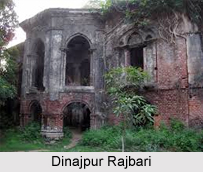 Karrani Dynasty was the last Bengali Muslim Dynasty of Islamic era in India, when Delhi was governed by mighty Mughal Ruler Akbar.
Karrani Dynasty was the last Bengali Muslim Dynasty of Islamic era in India, when Delhi was governed by mighty Mughal Ruler Akbar.
Foundation of Karrani Dynasty
Karrani Dynasty was founded in the year 1564 by Taj Khan Karrani, an ethnic Pashtun from the Karlani Afghan tribe. It was the last dynasty to rule the Sultanate of Bengal.
History of Karrani Dynasty
Karrani Dynasty was formed with the hands of Taj Khan. Taj Khan was formerly an employee of the Afghan Emperor Sher Shah Suri. From 1562 to 1564, Taj Khan captured south-eastern Bihar and western part of Bengal, and with his assassination of the last Muhammed Shahi ruler, he seized all of Bengal. The capital was at Sonargaon. Taj Khan was followed by Sulaiman Khan Karrani, who shifted the seat of government from Gaur, now in Malda to Tanda in 1565. In 1568, Sulaiman Khan annexed Odisha to the Karrani sultanate permanently.
Acceptance to Emperor Akbar
Nominally Karrani dynasty accepted sovereignty of the Mughal Emperor Akbar and his Prime Minister Lodi Khan placated the Mughals with gifts and banqueting. Sulaiman Khan`s authority extended from Cooch Bihar to Puri and from Son River to Brahmaputra River.
Disturbance in Political Situations and its Decline
On 25th September 1574, the Mughal general Munim Khan captured the Karrani capital Tanda. The Battle of Tukaroi fought on 3rd March 1575 forced Daud Khan Karrani, the last Karrani ruler, to withdraw to Odisha. The battle led to the Treaty of Katak in which Daud ceded the whole of Bengal and Bihar, retaining only Odisha. The treaty eventually failed after the death of Munim Khan who died at the age of 80 years in October 1575. Daud Khan took the opportunity and invaded Bengal, declaring independence from Akbar. The Mughal onslaught against the Karrani Sultanate ended with the battle of Rajmahal on 12th July 1576, led by the Mughal general Khan Jahan I. Daud Khan was executed. However, the Afghans and the local landlords known as Baro Bhuyans led by Isa Khan continued to resist the Mughal invasion. Later in 1612 during the reign of Emperor Jahangir, Bengal was finally integrated as a Mughal province
Related Articles
West Bengal
History of West Bengal
Medieval History of Bengal
Nawabs Of Bengal
Ancient History of Bengal
Najimuddin Ali Khan
Bengal Subah in Medieval History
Revenue Policy of Mughals in Bengal
Tax System under Mughals in Bengal



















